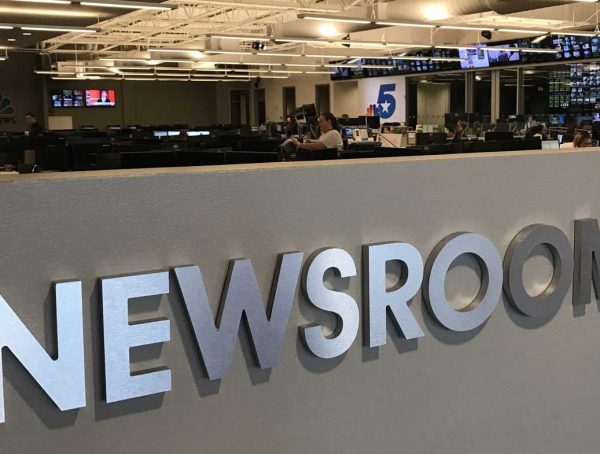by Margie Ruttenberg
 I remember that big, bright, noisy newsroom. I was 18 years old. I was an television news intern, and I must admit, I was a bit intimidated. But soon, everything that seemed scary started to make sense. Grateful for that experience, I jumped at the chance to manage the intern program at WRC-TV in Washington, DC. [Ruttenberg, a former executive producer at WRC, is now assistant news director at WTTG-TV in Washington.]
I remember that big, bright, noisy newsroom. I was 18 years old. I was an television news intern, and I must admit, I was a bit intimidated. But soon, everything that seemed scary started to make sense. Grateful for that experience, I jumped at the chance to manage the intern program at WRC-TV in Washington, DC. [Ruttenberg, a former executive producer at WRC, is now assistant news director at WTTG-TV in Washington.]
THE MISSION
The mission of our internship program is to introduce students to every aspect of our newsroom, within a structured and supervised environment. The goal of the program is two-fold: (1) give students a broad understanding of how a local newsroom works, and (2) help them focus on their own goals for the future. Translation: interns do not make coffee. They do not run personal errands. They DO answer newsroom phones, but hey, don’t we all?
THE FRAMEWORK
As soon as I took over the intern program 2003 I began to formalize it. I was tired of seeing the interns sitting around doing nothing. It is crucial that there is at least a framework of organization for interns; if not, they will fall through the cracks. Too much happens in a TV newsroom each day and too often, the people who need the mentoring the most are forgotten about. At least with a little structure the interns and the staff know there are goals and objectives to meet daily, weekly or even monthly. We recruit interns three times a year: Fall/Winter; Spring and Summer, and normally take about five. The internships are unpaid. We take juniors or seniors in college, who get credit for their internships. Interns answer questionnaires on their first day and their last: The entry questionnaire asks them about their interests and goals and what they do to keep up with the news. This lets me get to know their interests quickly, and their strengths and weaknesses. Before they leave, they fill out another form which is basically their evaluation of the internship.
THE ROTATION
Our interns spend time in each area of the news department, observing, learning, and to the best of our ability with union restrictions, performing. They rotate through each department, from the desk to producing, writing, reporting, editing and directing. They ALWAYS spend two full weeks on the assignment desk in the beginning to get to know the staff and our systems.. Ideally, they spend a week in each of the other rotation areas. Interns attend editorial meetings and work closely with assignment editors, production assistants and producers. Interns are also assigned to observe our technical side, by shadowing directors, editors and technicians. Along with understanding how our process works in the newsroom, the students get a great first hand look at how we report, and what we report, by shadowing teams in the field.
HANDS-ON EXPERIENCE
After the rotation, the students zero in on the area that interests them the most. Some choose to report. Others want to write or learn to produce. The interns are given tasks which are directly related to their area of interest. A student who wants to report is assigned to a reporter. After going out on a story with that reporter, the intern writes his or her own package, using the tapes shot that day. Interns who want to produce are assigned to create mock rundowns, write their own stories and teases. I have periodic one-on-one evaluations with each student to chart their progress. At the end of the semester, we create an intern newscast, produced and reported by News4 interns.
THE LESSONS
Each day in a newsroom is different: some days are busy, others are boring. Our interns know that spending a boring day surfing the Internet is not acceptable. They are encouraged to practice their writing, sit in on an edit session, or work with the production assistants as our shows go to air. Any task worth doing or learning is worth explaining. When a member of our staff assigns an intern to a project, they explain WHY that project is important to the operation. For example, while spending time in the editing department, an intern may be asked to help in the tape library. Why would an intern who wants to be on the air be interested in how a tape library is organized? Tell them that ONE day, when THEY are reporting or producing, they will certainly need file tape. Ask them, would they like to have an organized tape library so they can find their file, or would they rather have a big black hole in their package? Put it that way… and they’ll start to care.
THE PAYOFF
Our internship program works in large part because the newsroom staff believes it’s important to expose the next generation to the news business. From the anchor to the audio technician, everyone in a newsroom can pass on a piece of the knowledge. The more open the intern is to understanding, the more the student will gain. The newsroom also benefits by having the interns around. They can help a news department in several ways: by conducting research and making beat calls for the assignment desk, by helping reporters research stories and log tape, and by helping production assistants with their duties. For me, the best part is often times you find your next production assistant or entry level employee from a great crop of interns.My greatest joy is seeing it “CLICK” for in intern. That one moment, when they actually GET IT. I remember my moment.. more that 20 years ago, when the newsroom didn’t seem so big, but the lights seemed brighter than ever.








